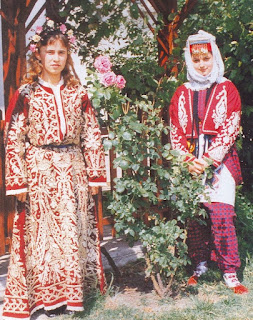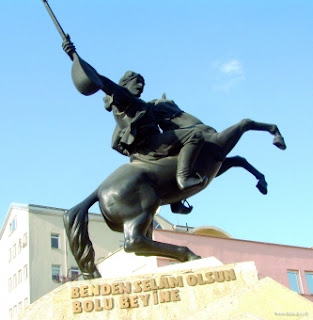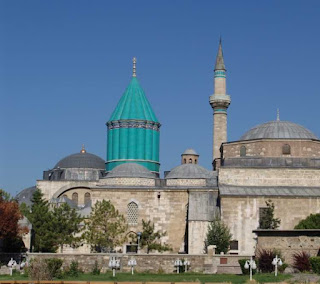TRADITIONS IN BOLU
Hello my dear friends! Today I am going to tell you about traditions in Bolu. Let's start with marriage traditions:)
Marriage Traditions:
Sherbet is drunk at the girl's house during the promise ceremony. Before the engagement, the bride and groom's belongings and jewelry are bought. Invitations are distributed one week before the wedding. The wedding starts on Thursday with the hanging of the dowry. Before the dowry leaves the girl's house, the bride's brother or relative sits on the chest and receives a tip.
During the wedding, the bride is accompanied by her sisters-in-law and the groom by his best man. On Friday or Saturday evening, a henna night is held at the girl's house. When the bride is to be hennaed, she does not open her hand without receiving a gift. On the night of henna, there is a tradition of 'mourning', that is, making the bride cry. And after the henna is burnt, the bride breaks a jug.
The next day is the day of the bride's reception. On the day of the bride's reception, the bride is not taken out of the house without a tip. When the bride arrives home, oil and honey are smeared on the threshold of the door with the wish that they get along well. She is given bread under one arm and the Holy Quran under the other, and nails are hammered into the threshold of the door to bind her to her home. Official and imam marriages are performed.
Birth Traditions:
According to folk belief, pregnant women do not touch other people's property without the knowledge of the owners, otherwise the child to be born will be a haramzade. If hairy objects are looked at, the child will be hairy, the mother who wants a hazel-eyed child looks in the mirror. Pregnant women should not eat buffalo cream, otherwise the child will be born prematurely. The child's name is given on the day it is born. The puerperal bed is kept for seven days. When the child is forty days old, it is taken to the bathhouse with its mother and relatives. The mother is not allowed to see the baby while it is being bathed; if she does, she will get scared and sick. When the baby is bathed, gold is thrown into the water to beautify the baby. To make the baby walk faster, on a Friday, the baby's two feet are tied with a rope and taken to the mosque, where the rope is cut by the first man coming out of the mosque. Relatives and neighbors go to see the baby with their gifts, where the guests are offered puerperal sherbet. The person who goes to see the baby tears a piece of rope from his/her clothes and puts it on the swaddling clothes. According to another belief, the puerperant woman is not left alone in her room for forty days. Gifts are given to those who see the child's first tooth.
Eid Traditions:
Eid al-Adha, our religious holiday, is celebrated according to religious obligations. Three months before Eid al-Fitr, preparations begin in every household. Those who wish start fasting for three months or fast for three days.
After the fifteenth of Sha'ban, cleaning begins. Windows are wiped and laundry is washed. In preparation for Ramadan, neighboring women gather and roll out phyllo dough. Since they are fasting, not much housework is done. The Qur'an is read and the mukabele is performed. During Ramadan, every house tries to drink Bolu's famous 'kökez' drinking water, and water is carried to the elderly. Poor and widowed women are taken to iftar dinner first, and those in need are helped. In addition to the iftar ball, which has become the symbol of Ramadan, and the drum played at sahur, there is also the Ramadan pita. Before iftar, soup, pilaf, dolma, meat dish, pleasantaf, salad and dessert are prepared.
Hıdırellez Traditions:
On this day, people go on picnics, ride on swings and it is believed that sins will be cleansed. When milk is left unfermented overnight, it is believed that Hızır will come and touch the milk and ferment it. If the unfermented milk becomes yogurt, a finger is taken from the yogurt and spread on other foods for a year.
Thyme is believed to be medicinal if gathered in the days after Hıdrellez. A place with water and greenery is usually preferred for the celebrations. A jar is buried at the base of a rose tree in the evening the day before and opened in the morning. No field or garden work is done that day. Those who want a house build a house in the garden of their house, and those who want a baby make a doll out of cloth. A fire is lit and jumped over.
Nowruz Traditions:
On March 21, people go to promenades in groups to celebrate the arrival of spring. On this day, shrines are also visited and wishes are made. Various entertainments are organized in the countryside. Manis are sung, intentions are made and the first flowers of spring are picked. People get up early in the morning, bathe in the first water of Nowruz and dress elaborately on this day. Eggs dyed with onion skins are cooked and eaten with the wish for abundance and fertility. A fire is lit on a high hill to herald the arrival of spring. Nowruz is known as "always heaven" in Mudurnu District and "March Nine" in Göynük District.
Circumcision Traditions:
Circumcision traditions are carried out with religious ceremonies. Mevlit is recited, rose water and Turkish delight are served. Guests bring gold or other gifts. The circumcision owner serves food to the guests. Entertainment is organized accompanied by drum and zurna.





.jpg)
.jpg)


Comments
Post a Comment